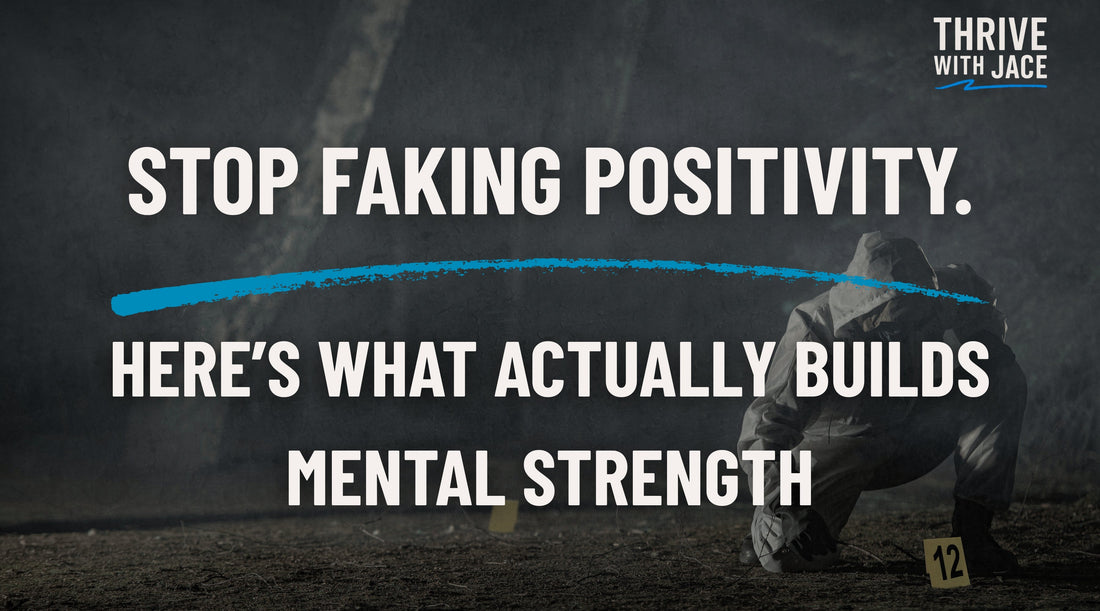
Stop Faking Positivity. Here’s What Actually Builds Mental Strength
Share
You ever forced a smile when your world was falling apart?
Told someone you were “fine” while quietly burning out?
Yeah, me too.
For years, I thought being strong meant staying upbeat no matter what.
Positive vibes only. Keep it light. Don’t complain. Don’t show weakness. Just crack on.
But here's the truth that hit me like a freight train.
Faking positivity doesn’t make you strong. It makes you numb.
The Trap of Forced Positivity
There’s a difference between choosing to stay hopeful and pretending everything’s okay when it clearly isn’t.
One is grounded. The other is performance.
We’ve been sold this idea that resilience means keeping your chin up at all times.
Smile through the stress. Spin the pain into some kind of inspiration on the spot.
What a load of rubbish.
Resilience isn’t pretending life’s not hard.
It’s facing the hard stuff without letting it rot you from the inside out.
My Breaking Point (And the Mask I Was Wearing)
A few years back, I was juggling way too much. Work pressure, personal chaos, and a quiet, growing sense of burnout. But I kept telling myself:
“You’re the strong one. You don’t crumble. People are relying on you. Just keep going.”
So I kept the mask on.
Said yes to everything.
Smiled when I wanted to scream.
I even gave people advice I wasn’t following myself. Telling others to rest while I was averaging four hours of sleep and surviving on caffeine and adrenaline.
One day, I remember standing at a scene. It was grim. But what hit me wasn’t the scene itself. It was this crushing wave of apathy. I felt nothing. Completely flat.
And that scared the hell out of me.
Because when you feel nothing, you stop caring.
And when you stop caring, you stop coping.
That’s when things break.
What Strength Actually Looks Like
True mental strength isn’t about being happy all the time.
It’s about being honest with where you’re at and still moving forward.
It’s feeling the stress and not letting it make you bitter.
It’s naming the fear instead of pretending it’s not there.
It’s sitting with frustration, sadness, anger, and not letting those emotions hijack your decisions.
That’s not weakness. That’s emotional discipline.
And that’s what nobody teaches you.
We’re told to “stay positive” but not how to process grief, shame, guilt, or exhaustion.
We’re told to “just breathe” but not how to sit in discomfort without spiralling or snapping at the next person who asks if we’re okay.
Why Faking It Backfires
When you fake positivity, three things happen:
1. You disconnect from yourself
You start ignoring your body’s signals. You override your gut instinct. You silence the warning signs that something’s off.
2. You lose connection with others
People can’t reach the real you if you’re always performing. It becomes impossible to have real conversations, because everything’s filtered through this forced smile.
3. You set yourself up to crash
Holding it all in doesn’t build resilience. It builds pressure. And eventually, that pressure explodes in one way or another.
I’ve seen this play out in tough jobs, tough relationships, even in the gym.
People pushing and pushing until something gives. Their health, their temper, their will to keep going.
So What Actually Builds Mental Strength?
Here’s what works. And it’s not glamorous. It’s gritty.
1. Name What You’re Feeling
If you’re angry, say you’re angry. If you’re gutted, admit it. Don’t dress it up as “just a bit off”.
You can’t fix what you won’t face.
That takes emotional intelligence. The real kind, not just knowing big words for your moods.
2. Accept the Chaos
This doesn’t mean give up. It means stop fighting reality.
Chaos happens. Things fall apart. You will be knocked sideways.
Accepting it is the start of getting through it, not the end of trying.
3. Find Your Anchor
Have something that grounds you when your emotions are all over the place.
It could be your values, your routine, your mates, or your non-negotiables.
Mine? A simple reset routine I turn to when I feel myself spinning. No motivation needed. Just action.
4. Control the Controllables
You might not be able to change what’s happened, but you can always control how you show up next.
What you do with your morning.
How you treat others.
Whether you take the next right step or not.
Control is never all or nothing. It’s in the small things.
5. Stop Judging Your Emotions
Feeling low doesn’t make you weak.
Crying doesn’t mean you’ve lost it.
Being pissed off doesn’t make you a bad person.
It makes you human. Let it be. Then decide what comes next.
The Moment I Turned It Around
It didn’t happen overnight, but once I started being honest about what I was actually feeling — with myself first, then with others — things started to shift.
I wasn’t stuck in a war with myself anymore.
I wasn’t faking it for the sake of looking composed.
I started showing up with more clarity, less resentment, and more energy than I’d had in months.
And here’s the mad part. The people around me respected it more.
They connected with it. Because everyone’s tired of the act.
We don’t need more polished positivity.
We need people who are willing to get real, get raw, and still show up.
If You’re Nodding Along Right Now
You don’t need another motivational quote.
You need tools. Structure. A system you can fall back on when your head’s a mess.
That’s exactly why I created this:
✅ The 3-Day Resilience Reset (free email course)
Quick, powerful daily prompts to get your mindset back on track fast. No fluff. No nonsense.
📖 The first 30 pages of my book Thrive in Chaos (also free)
Get inside the book that’s helping people like you stay grounded, focused and mentally tough through absolute madness.
🧠 And the Resilience Rapid Response Kit
16 printable tools to get control back when chaos hits. Worksheets, checklists, and exercises I actually use myself.
Final Thought
Stop performing.
Start feeling.
That’s where your strength is.
Mental toughness isn’t about staying positive.
It’s about being honest, focused, and grounded, even when everything around you isn’t.
And you don’t have to do it alone.
